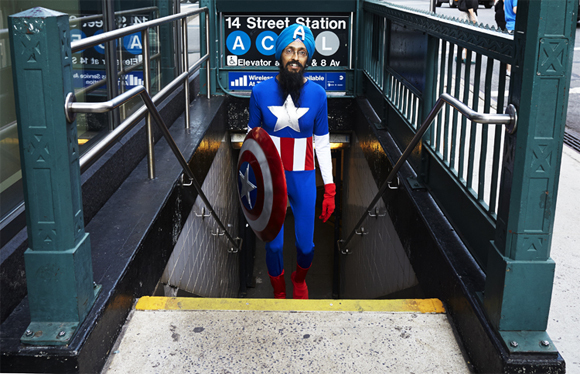With the launch of G. Willow Wilson and Sana Amanat’s Ms. Marvel series featuring a teenage, American Muslim girl, S&S’s A. David Lewis discusses what’s at stake on ISLAMiCommentary. Read here.

With the launch of G. Willow Wilson and Sana Amanat’s Ms. Marvel series featuring a teenage, American Muslim girl, S&S’s A. David Lewis discusses what’s at stake on ISLAMiCommentary. Read here.


In September, Salon.com contributor Vishavjit Singh, on the anniversary of his article “My Life in a Turban” and, of course, the 9/11/01 New York Trade Center attacks, wrote about his experience as “Captain American in a Turban.” Singh, a software analyst by day and an editorial cartoonist by night, took to the streets of New York City adorned in Captain America’s superhero, superpatriot garb to test perceptions — and reactions — of America.
It was the most unlikeliest of days for me. Hundreds of strangers came up to me. And we were able to lay to rest any anxieties or inhibitions in those moments — about other people, about the unknown, about ourselves, about violating other people’s personal spaces or not understanding their beliefs. We could simply meet. Say hi. Snap a memory of that moment. Continue reading Turban, not Wingtips

Part of Rao’s modus operandi is to catch religion and comics stories in the news as they happen and save them to a repository for later re-reading, analysis, and then write up. Of course, while that allows for cautious commentary and limited knee-jerk reaction, it also can cause a back-up of reportable items, sometimes having them fall completely off the radar.
In this case, however, there’s been another intriguing effect to this scheme: The backlog of reportable items is hinting at a trend.
That is, despite coverage over the last several months of, say, the Muslim Superhero Tournament on The Huffington Post or a politician claiming Batman is only for Judeo-Christians, still a massive amount of news concerning Islam and comics has amassed for Rao “backstage.” More than any other religion, Islam seems to have the most constant, news-worthy engagement with the medium, over any other faith or community circa 2013. For instance:
Response to the Burka Avenger is still unfolding, but, unquestionably, it will be met with a steady stream of new news stories on comics engagement with Islam globally, culturally, artistically, and politically. They are everywhere.
Rao wants to know: Does modern Islam have a special relationship with the comics medium?
 In the wake of the Boston Marathon Bombing and capture of suspect Dzhokhar Tsarnaev, Boston University Associate Professor Kecia Ali was invited as a guest blogger for NPR affiliate WBUR’s Cognoscenti where she recounted not only running a 5-kilometer fundraiser with a “Heroes and Villains” theme but also having to convince a fellow runner that her costume as Dust of the X-Men was actually heroic.
In the wake of the Boston Marathon Bombing and capture of suspect Dzhokhar Tsarnaev, Boston University Associate Professor Kecia Ali was invited as a guest blogger for NPR affiliate WBUR’s Cognoscenti where she recounted not only running a 5-kilometer fundraiser with a “Heroes and Villains” theme but also having to convince a fellow runner that her costume as Dust of the X-Men was actually heroic.
Dust, of course, brings the veil front and center. She may be a rare positive representation of a Muslim woman in comic books, but her character is affected by Orientalism and sexism. Does she break down stereotypes, or does she reinforce them?
Ali pointed to an earlier writing by blogger Broken Mystic on the character of Dust and the complexities her portrayals present:
So overall, can we appreciate a character like Dust? I think we can; however, there is a lot of room for improvement. […H]er character is incomplete and her character suffers from stereotypes that are due to misunderstandings about Islamic beliefs and practices.
What with the recent headlines generated by DC Comics’ introduction of Simon Baz as a new Green Lantern, are Marvel Comics readers likely to be reintroduced to Dust anytime soon?

In July of 2012, the Huffington Post reported that Representative Louie Gohmert (R-TX) responded to the Aurora movie theater shootings by stating that “the shootings […] were a result of ‘ongoing attacks on Judeo-Christian beliefs.'” These comments from The Heritage Foundation’s “Istook Live!” radio show have some ugly implications to them: not only do Batman movies attract primarily Judeo-Christian audiences (hmm, ok…) but that the victims of the shooting were paying the price for attacks on specifically this theology. Link this to the relatively Orientalist nature of the first and third films’ villains (i.e. Ra’s al Ghul), and there’s a growing strain (see previous “By Rao!” posts) of either Islamophobic or non-ecumenical taint artificially attaching itself to Batman’s mythos.
Rao wants to know: Is Batman becoming associated with a particular faith?